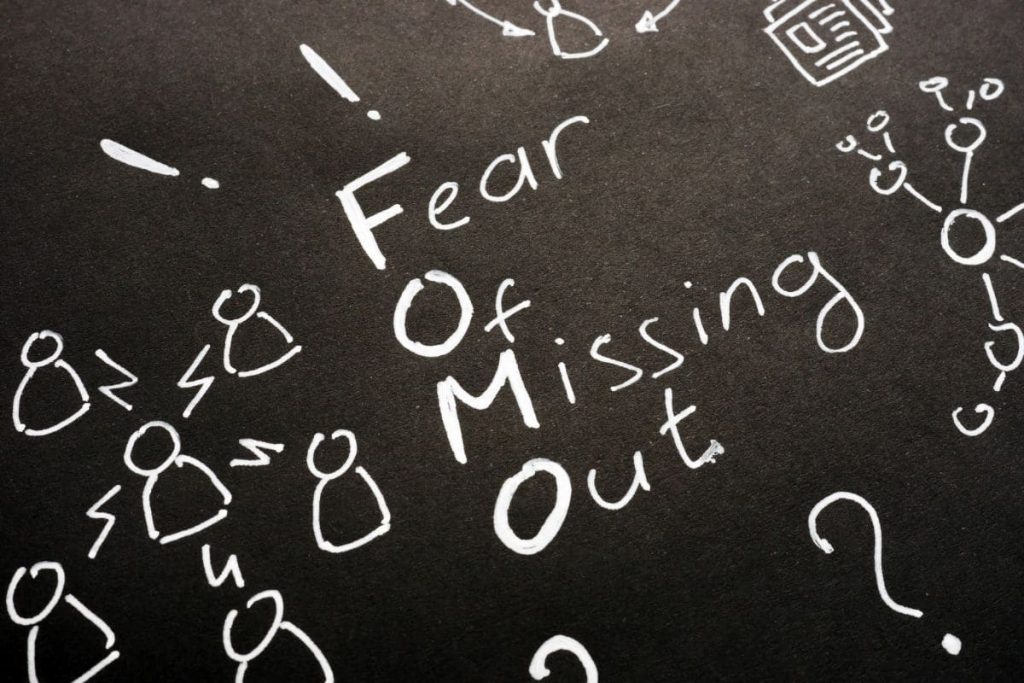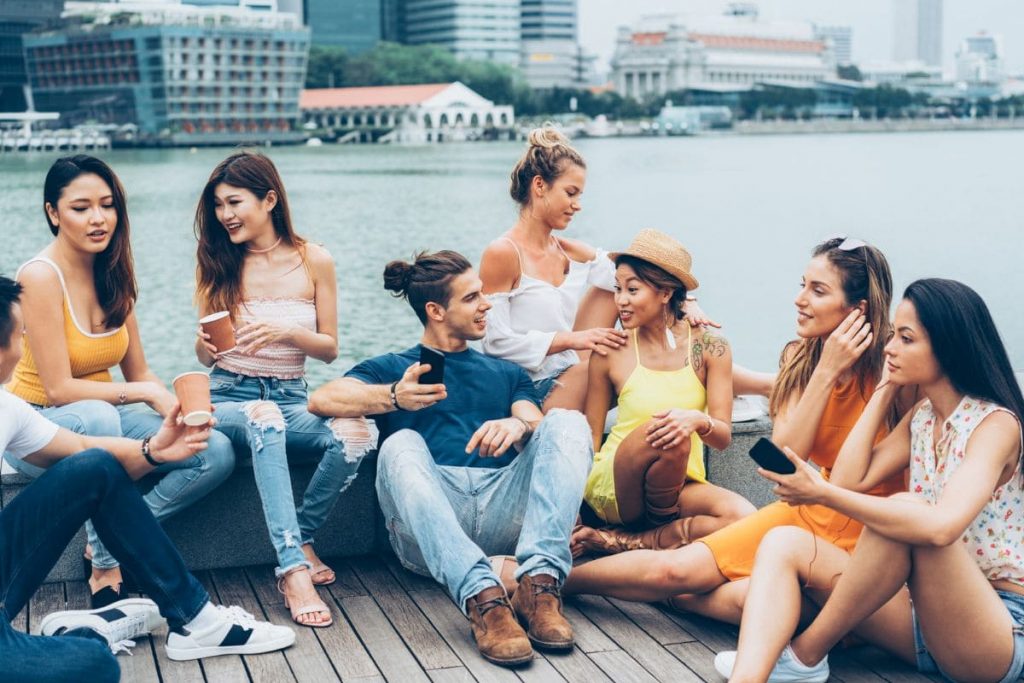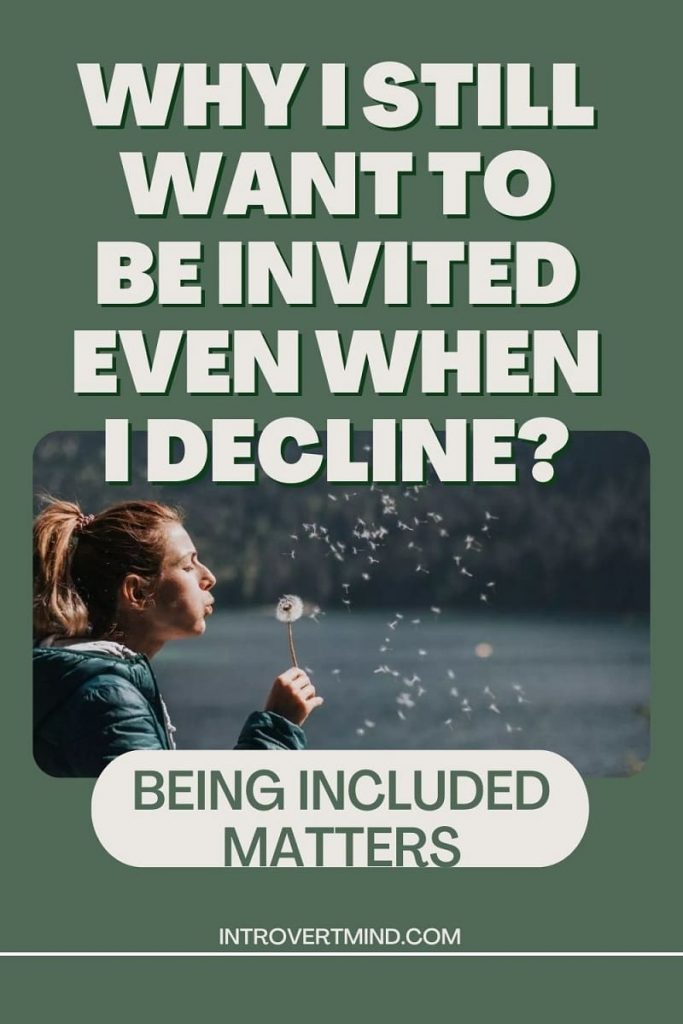It’s happened to me more times than I can count. Someone invites me to hang out, and I have to decline due to a prior commitment or just because my schedule is too full.
Even though I know that it’s inevitable at some point in life, the feeling of being excluded still hurts nonetheless. That’s why being included matters—it keeps us connected with our friends and reminds us we are important.
In this article, I’ll be discussing why it feels so good when someone remembers to invite you even if you already said no. We all want to feel wanted and appreciated, but sometimes we forget how much power lies within gestures like an invitation.
I’m sure many can relate to this sentiment–I know I certainly do! Throughout this piece, I will explain from my own experience why wanting to be invited despite declining is completely normal and something everyone should strive for regardless of their current situation. So let’s dive right into exploring why being included matters!
What Does It Mean To Be Included?

Being invited to something, whether it’s a gathering of friends or an event hosted by someone else, not me, is a feeling that I can’t quite put into words – but one thing is certain: when someone doesn’t invite me, I can feel left out and excluded.
It’s even worse if the people hanging around me are talking about how excited they are for the event or outing without inviting me along. It makes me feel lonely like no one cares about my presence or wants to include me in their fun activities.
When others don’t make any effort to invite me to join them, I start to feel uncomfortable and question why I am not included.
In short, being included matters because it lets us know that we matter too; that our friendship and relationship with those around us are valued and appreciated.
Why Do We Feel The Need For Inclusion?

Have you ever felt left out by your friends? The sensation of being excluded from a friend group can be truly heartbreaking.
But why do we still desire to be invited? Even when we know we won’t accept the invitation to spend time with other friends is important in building relationships and making true friends that last.
Understanding our need for inclusion starts at an early age. As kids, we want to belong; it’s part of human nature. We develop social skills through interactions with others, so if those opportunities are taken away or limited due to exclusion, our sense of self-worth suffers as well.
Even adults feel this way when they’re not included in activities or conversations among their peers. It’s natural to have a fear of missing out on something special – whether it’s meeting up with old acquaintances or joining a new club of interest.
The Feelings Of Being Excluded – Feeling Left Out By Your Friends

When I’m not included in something, it can be really hard to take. Even if I decline an invitation or weekend plans, the feeling of being left out by my friends still lingers.
It’s like they’ve forgotten about me and my presence isn’t valued anymore. The thought that new friends might have replaced me is even worse sometimes. This type of exclusion can lead to low self-esteem as well as feelings of worthlessness and loneliness.
I know from experience how discouraging it can be when you’re no longer part of the crowd. Once I stopped going on regular outings with my good friend, she eventually stopped inviting me altogether – making plans without including me was her way of moving forward without saying goodbye.
That’s why being excluded feels so personal; for some reason, we assume our relationships will never change and when they do, it hurts more than anything else.
The Power Of Invitations

It is amazing how much power an invitation has. It can be like a lifeline, connecting us to new friends and social circles. We eagerly anticipate weekend plans or free time that give us the chance to accept invitations – it’s like jumping at the opportunity for something long-term.
We may think that declining an invitation eliminates any potential hurt feelings, but this isn’t always true. Even though we say ‘no’ on occasion, deep down there is still part of us hoping and waiting to be invited just so we don’t miss out on spending time with our peers.
Being excluded doesn’t feel good; however, taking control by deciding not to attend can of course also bring some level of comfort as well.
Why I Choose Not To Attend Events?

Sometimes, I just don’t feel like attending events. After a long, busy week at work or school, the last thing I want to do is attend a large party with lots of new people. It can be exhausting and overwhelming to make small talk while being surrounded by strangers.
Furthermore, it takes energy away from my other commitments – like spending time with family or friends or going on a long run. Even though I’m invited to social gatherings, I still choose not to go because it’s simply not what I need at that moment.
Choosing not to attend certain parties or events, allows me to focus my attention elsewhere, such as engaging in self-care practices like yoga or immersing myself in books. The benefits of reading for introverts are manifold, as it allows for solitude, reflection, and introspection, ultimately enriching the mind and nourishing the soul.”
This allows me to keep growing without feeling obligated to conform to societal norms of what one should do during their free time.
The Best Proven Strategies For Coping With Exclusion

Despite my hope of overcoming the fear of rejection, I still feel a certain sadness when I’m not invited to something.
It’s easy for me to tell myself that it isn’t personal and that there are many other reasons why someone wouldn’t invite me; but at the same time, being included is important. Being left out can be difficult emotionally and psychologically, making it hard to make new friends or even maintain old ones.
To cope with this exclusion, I’ve come up with some strategies over the years. The best-proven strategies to cope with exclusion are:
Focus On Activities That Bring Joy Instead Of What You’re Missing Out On
- Reading books, playing sports, painting, or other hobbies for introverts that bring purpose and fulfillment can help keep your mind from feeling excluded.
Find People Who Have Similar Interests
- This allows you to enjoy doing something without always relying on invitations from others.
- Having control over where you spend your time can be empowering.
Maintain An Optimistic Outlook On Social Situations
- Positive thinking about your life and experiences, even when you feel left out, can help ease feelings of exclusion.
- Remember that inclusion matters, but it doesn’t define you.
- Find ways to navigate times when you feel excluded while staying true to yourself.
FOMO – Fear Of Missing Out

Okay, so imagine you’re scrolling through your Instagram feed and you see all your friends having a blast at a party and you didn’t get invited to.
Suddenly, you feel this sinking feeling in your stomach – that’s FOMO! It’s that little voice in your head saying, “But what if I’m wrong and missing out on something awesome? What if everyone’s having more fun than me?”
FOMO stands for “fear of missing out”, and it’s that nagging feeling that you’re not part of the cool crowd. It’s like when you were a kid and you wanted to go to that sleepover party, but your parents said no. You spent the whole night worrying that you were missing out on all the fun, right?
Well, FOMO is kind of like that, but for grown-ups. It’s a common feeling in today’s world, where social media can make it seem like everyone else is living their best life while you’re stuck at home in your pajamas.
But don’t worry, FOMO doesn’t have to rule your life! Next time you feel that FOMO creeping in, take a deep breath, put down your phone, and go do something you love instead. Trust me, you’ll feel much better!
Importance Of Feeling Welcome

When I’m invited to a gathering or event, even though I may decline the invitation, it still matters that I was included in the first place. Being invited is a gesture of inclusion and makes me feel welcome.
I need to know that people want me around. That feeling of being wanted extends beyond just attending an event; it helps build strong relationships between friends, family members, and colleagues as well.
Being asked to be part of something shows respect and appreciation for my presence. When invitations are extended but not accepted, there should still be no question about whether I am respected or valued by those who invite me.
Having someone take time out of their day to include me in activities they value speaks volumes about our relationship and how much they care about having me involved in their life.
It’s important for us all to feel accepted regardless if we accept an invitation or not. Invitations show consideration and thoughtfulness which helps foster real connections with others. And when you’re connected with other people through mutual respect and understanding, everyone benefits from a stronger sense of community – one where we can all learn from each other, make valuable contributions and ultimately live happier lives together.
I Don’t Always Want To Hang Out But I Still Want To Be Invited – Things You Always Wanted To Know

How Can I Make Sure I’m Including Others In My Events And Activities?
Being inclusive is key to creating an awesome event or activity. That’s why I always make sure to invite everyone and make them feel like they belong! Here’s how I do it:
- Send out invitations well in advance so people can plan their schedules around them.
- Respect people’s decision to decline, but also find ways to keep them involved remotely.
- Keep the conversation open-ended and welcoming to new points of view.
By doing these things, we create a welcoming atmosphere where everyone feels appreciated and valued. It’s not just about attending events together, but building meaningful relationships that last. So next time you’re planning something, remember to be inclusive – it’s the key to a successful and enjoyable experience!
Are There Any Resources That Can Help Me Feel More Included In My Friend Group?

Feeling included in our social circle is so important! Here are some quick tips on how to make sure everyone feels welcome:
- Connect with people online to find new opportunities and events.
- Be present and listen, even if we don’t contribute much at first.
- Use email listservs or newsletters to stay up-to-date with what’s happening.
- Host a potluck dinner or movie night to get to know everyone better.
Let’s make sure no one feels excluded from our social circles – inclusivity for the win!
What Can I Do To Be More Open To Invitations Even If I Don’t Want To Attend?

Being open to invitations can help you maintain positive relationships with others, even if you can’t always attend the events or activities they invite you to. One way to be more open is to express gratitude for the invitation, even if you can’t attend. Letting the person know that you appreciate the invitation shows that you value your relationship with them and helps maintain a positive connection.
Another way to be more open to invitations is, to be honest about your reasons for declining. You don’t have to wait, make up excuses, or pretend to be interested when you’re not.
Offering an alternative way to connect with the person who invited you can also show that you value the relationship. For example, if you can’t attend an event, you could suggest meeting up for lunch or coffee or having a phone call instead.
Finally, keeping an open mind can also help you be more open to invitations. Sometimes, saying yes to an invitation can lead to unexpected experiences and opportunities.
At The End Of The Day, Inclusion Starts With Ourselves

Inclusion is something we all strive for, and it’s important to remember that being included matters. It can be difficult when you feel like you’re on the outside looking in, so make sure to reach out to those around you and invite them into your circle of friends. Even if someone doesn’t accept an invitation, they still appreciate being invited and knowing that they are wanted.
Take my friend Emma as an example. She recently moved away from her closest group of friends and was feeling a little lonely at first. I made sure she knew she was always welcome to join us whenever we got together, even though she couldn’t commit every time due to work or other obligations. Knowing how much she valued our friendship meant a lot to me and gave her reassurance that we were there for her despite the physical distance between us now.
At the end of the day, inclusion starts with ourselves. We need to learn how to create more inclusive environments by opening doors for others no matter what their circumstances may be. By doing this, we will foster stronger relationships with one another while also helping everyone feel more connected and accepted within our social circles.


